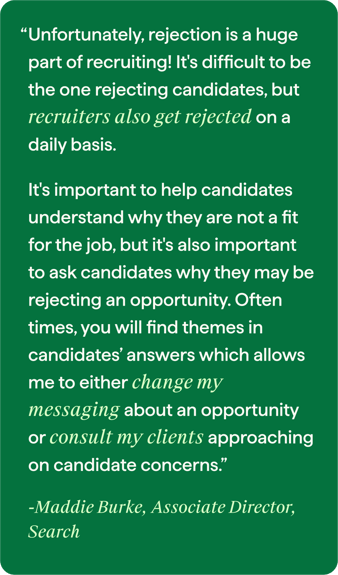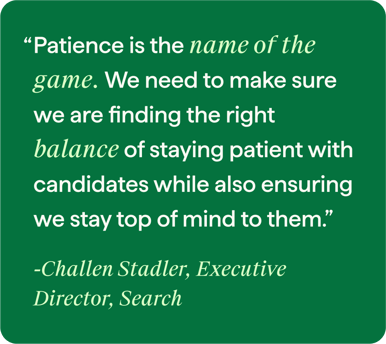Recruiting can be an intensely competitive business — especially if you’re searching for the best talent to fill roles in growing companies. That’s because startups and enterprises alike need the right candidates at the right time to really help them thrive and maintain long-term growth. And they must fill these roles all the while highly-qualified talent becomes harder to find.
If you’re looking for ways to build out your skills to master the art of recruiting, then we have the top 10 skills you’ll need to succeed.
Plus, you’ll hear from two of our own top recruiters and their best tips and insights to help you be even more successful.
1. Strong Negotiation Tactics
No matter what growth stage a business is in, all growing companies share one thing in common: There are a lot of costs involved in scaling.
When it comes to talent acquisition, most businesses need to tread carefully, striking the right balance between bringing in necessary skills and keeping costs in line. While negotiating salaries is a big part of this, a recruiter also needs to carefully consider — and be prepared to negotiate — other key fringe benefits, like paid leaves or travel requirements.
Remember, beyond just filling open positions, a recruiter’s job is to consider what’s best for the company and the candidate. A recruiter with strong negotiation skills can keep all parties satisfied while protecting their best interests.
2. Excellent Verbal and Written Communication
As a recruiter, that means you need to have excellent soft skills — especially verbal and written communication skills. A lot of time is spent composing messages, having phone conversations, and holding synchronous interviews, and these interactions are where candidates form an impression of you.
To position yourself and your client company in the best light, stay on top of your communications and keep your response windows short to show candidates that you respect their time. While communicating with candidates (whether verbal or written), recruiters should be clear about expectations throughout the entire recruitment process so that candidates are never left in the dark.
 Key Insight From Real Hunt Club Recruiters:
Key Insight From Real Hunt Club Recruiters:
"I find it really valuable to spend time getting to know both my clients and my candidates. This means asking about what is going on in their personal life, how their team at work is doing, and reasons they might be interested in working with me. It's important that I am transparent in my communication so that I get it in return.”
- Challen Stadler, Executive Director, Search
3. Relationship-Building Skills
For any recruiter, networking is essential.
Growing companies often need support from recruiters and who they know across their industry and even beyond it. Honing your skills for connecting and keeping in contact with other professionals means that you’ll easily find candidates with the skills and experience needed to help businesses find their bullseye candidates.
Hone not only your active listening skills, but also your sales skills and ability to read body language in order to make the most of networking and relationship-building opportunities.
Also, keep in mind that many top candidates may be passive or not actively looking for a new role. This is why it's crucial for recruiters to be skilled in maintaining real relationships and connections with candidates who may become active in the future. Those relationships contribute to a successful long-term talent acquisition strategy and help build a strong candidate pipeline to pull from for future openings.

Key Insight From Real Hunt Club Recruiters:
“Relationships are crucial in the job market right now. With record-breaking layoffs, funding volatility, and the general unknown of what's next in the economic environment, companies, recruiters, and candidates are all relying on their networks to make valuable connections
and reliable hires.”
- Maddie Burke, Associate Director, Search
4. Careful Attention to Detail
It's often the small details that separate good recruiters from great recruiters. A great recruiter can recall the seemingly minor details about the company or the candidate’s needs, preferences, and personality, which a good recruiter may not identify as important or relevant.
For example, perhaps in a passing conversation your client company mentions hosting a virtual trivia night once a month. When interviewing a candidate, they mention that one of their pastimes is trivia. While hobbies and pastimes aren’t deciding factors, great recruiters can recall this type of information to help gauge the cultural fit of two otherwise identical candidates.
This attention to detail strengthens the connection, builds the relationship, and shows both parties that they truly care about the outcome.
5. Time and Task Management Skills
Each day, recruiters sift through resumes, screen candidates that could match a particular role, hold interviews, conduct background checks, make employment offers, and more. There will also be days or weeks when recruiters need to attend conferences, job fairs, or take advantage of other networking opportunities.
And those are just the basic tasks expected of a recruiter. In order to fit it all in, a great recruiter will have exceptional multitasking, time-management, and task-management skills.
6. Marketing Skills
Marketing is another thing that recruiters do as part of their job. In fact, think of recruiting as a form of marketing — except instead of selling products to customers, you’re marketing companies to job seekers.
Research finds that job listings that emphasize selling a company’s culture rather than the position on its own tend to be far more successful. With this in mind, effectively promoting a company’s brand to recruit may be a key area to focus on.
You’re not just selling open positions on job boards. You’re selling your brand and its benefits to someone who will help it grow and develop. You can market it as you would any other product: honestly, sincerely, and in a positive light. Strong brand management and effective, consistent advertising schedules can play a key role in finding and retaining appropriate talent.
 7. Reliability and Resilience in the Face of Rejection
7. Reliability and Resilience in the Face of Rejection
The best recruiters also need to be reliable, self-motivated, and resilient. The truth about recruitment is that it’s a highly competitive job.
You’ll be fighting against competitors to get the word out about your company and to attract the best candidates.
Rejection is a natural part of the process.
However, a reliable, resilient recruiter will be ambitious enough to keep pursuing goals and hitting targets despite the challenges.
8. Patience
Recruitment can be a time-consuming and highly selective process — especially when you consider that most top talent is already employed elsewhere, and you’re going after primarily passive candidates.
Because passive candidates are not necessarily looking to leave their current roles, it may take a bit more effort to attract them to your open position. As these individuals are already working, it may take longer to hear back from them than active job seekers.
Remember, you’re aiming to find someone to help companies build from the ground up or help exceed its already-established goals.
Rushing the process might mean recruiting someone who doesn’t align with a company or brand, which means you may have to let them go and start all over again.
So be patient with the process, and take your time in selecting a candidate who fits your needs.
It may well be worth the wait: A solid recruitment strategy will likely continue to benefit you as your business grows, and can play into your overall talent acquisition strategy.
9. Ability To Use the Latest Tools and Technologies
As technology continues to evolve, new tools will keep emerging to help you be a more effective and successful recruiter. Today’s recruiting tools can help you with sourcing, organizing and screening applicants, posting job descriptions, marketing job vacancies, tracking candidates through the application and hiring processes, and much more.
To be competitive, you should be familiar with the latest recruiting software and tools — and you’ll be able to leverage them to find the best candidates as efficiently as possible.
10. Analytical Skills
Data is a key part of most modern businesses these days — and that’s just as true among recruiting agencies as anywhere else.
To be competitive, you’ll need to be able to track and analyze a variety of recruiting metrics to understand both your own performance and how candidates are performing in the roles in which you’ve placed them.
Build analytical skills to use data and streamline your hiring process, remove biases, improve your quality of hire, cut down on recruitment expenses, and more.
More Tips for Becoming a Successful Recruiter
Now that you know the essential skills you’ll need to be a good recruiter, let’s look at some tips you can use to make yourself more effective at the recruiter job. Read below for ideas on new technologies, ways to round out your skill set, and more.
Track and Monitor Your Efforts
If you’re familiar with marketing analytics, the same principles apply here.
Gather data on your staffing efforts to track and monitor your efficacy — and make continual improvements over time.
There are lots of metrics you can track, too.
For example, whenever you post job openings, track the numbers of potential candidates — and their quality — respective to the job board or social media platform on which you’ve posted the job. This will help you determine the best sources for great candidates.
At a minimum, track and measure the candidate experience throughout the onboarding process, employee retention, and the number of people who complete the hiring process from the discovery stages to the job offer. These things will help you learn where you can improve your process even more.
Create SMART Goals
SMART stands for:
- Specific
- Measurable
- Achievable
- Realistic
- Timely
When you create goals, create them with each of these five factors in mind. Why? Because creating SMART goals helps you to create clear, focused goals that are realistic in terms of both achievability — and achievability within a given time frame.
For example, rather than a goal that simply states, “I want to fill two senior-level positions at this company,” design a goal that hits the SMART criteria:
You could even turn that single broad goal into two more specific goals to give you crystal clear direction:
- I want to hire a CMO with a background in information technology within the next three months.
- I want to hire a CFO with at least three years of experience working directly with investors within the next six months.
Use the Right Technology and Tools
The world revolves around technology today — and as a recruiter, if you want to be competitive, you’ll use the right technology to help you be more efficient as you work hard to attract the top talent.
This means learning how to use applicant tracking systems, marketing software, and how to pull analytics from the platforms you use to post job openings and track candidates.
It also means leveraging automation to help you with more mundane tasks, like screening applications for particular hard skills or other must-have factors.
Further Your Education by Taking Courses or Attending Events
Another part of remaining competitive is keeping your education current. That doesn’t mean you need to go back to college for another four-year degree program. But it does mean that whenever possible, you should further your skills by attending educational events or taking online courses.
Keep an eye out for education opportunities and certifications that can help you learn new technology, hone your marketing skills, build even better soft skills, and more.
Recruiter Academy offers several courses for recruiters that you can register for online that give you credit hours toward certifications, and Udemy offers thousands of affordable classes that can help you build soft and hard recruiting skills.
Hire Top Candidates With Hunt Club
Your business is only as good as the people who build it, so it’s crucial to find and hire the very best people.
Let us help you find them.
At Hunt Club, we have leading, specialized Talent Advisors and recruiters with industry expertise, market insights, and a deep network of connections to help you find your bullseye candidate.
If you need an extra helping hand, turn to Hunt Club to discover how our recruiters, our technology, and our robust network can take your business's recruiting process to the next level.






